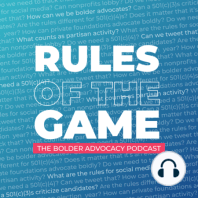25 min listen

Lobbying Series Part 2 - Direct Lobbying
Lobbying Series Part 2 - Direct Lobbying
ratings:
Length:
19 minutes
Released:
Jan 27, 2021
Format:
Podcast episode
Description
On this episode, our second in our ongoing lobbying series, we’ll focus on direct lobbying for public charities that have taken the 501(h) election. For an introduction to lobbying and more on the 501(h) election for public charities, see part 1 of the series. Attorney Co-hosts Jen Shyaam Leslie Not all advocacy counts as lobbying Communications aimed at executive orders or special purpose bodies like school boards (even though they are elected, those school boards don’t make new laws!). Example: asking the incoming Biden Administration to rejoin the Paris climate agreement or ban fossil fuel production on federal lands through Executive Order. Example: The incoming Biden Administration might be able to take executive action to dramatically expand the number of gun sellers required to do background checks. What counts as direct lobbying under 501(h) Remember that 501(h) is an expenditure test so it only counts what the organization spends on the communication that is lobbying (including staff time and overhead). If you are an all volunteer organization, you should keep track of your time for your own purpose but unpaid volunteer time wouldn’t be counted on the 990 at the end of the year. However, any expenses to facilitate volunteer lobbying (e.g., reimbursements for meals or travel associated with lobbying) would need to be tracked and reported. Typically, the types of expenses you need to track are direct costs (e.g., travel costs), staff time, and overhead expenses. The three-prong defintion of direct lobbying A communication To someone who formulates legislation (like a legislator, or city council member) or their staff or committee staff Expresses a view about a specific piece of legislation Communication Tweets, emails, letters. Preparation for those communications too. One on One meetings (when we can do those!) Or good old fashioned phone calls? What does the communication say? Legislators (and their staff) The legislator that can make the decision needs to be the target of the communication. And it’s at any level of government – city, county, tribal govt., state, federal, even international. It can be broader though to include his or her staff because those staff (like the policy director, or the chief of staff) are normally authorized to represent the views of their boss (the elected official). What about staff of the Committee on Appropriations when the nonprofit public charity seeks to ensure a line item in the budget to buy new land for a new state park? What about public testimony at the committee hearing when a bill is being considered and the nonprofit says “we support this bill in its entirety?” In a later episode we will talk about some exceptions, including being invited to give testimony. Executive officials in certain situations, too. Are members of the public ever considered “legislators”? Yes when voting on public questions, referenda, constitutional amendments, bond measures. Anytime voters are asked to vote “yes” or “no” in an election, may constitute “legislators” for the IRS for your organization’s advocacy work. Specific legislation The easy case is when the bill has a number, like HB 270. How about a piece of model legislation that your nonprofit public charity is trying to get adopted in your state? Or asking for a law to be enacted that was recently enacted in a neighboring state? Harder is when you’re working with a champion, an elected official that supports your mission, for example, to end homelessness. Is working with that officials’ office to highlight policy changes, perhaps discussing opportunities to revise statutes, or look for additional funding, is that lobbying? In some cases, you might just be educating legislators and not expressing a view on any specific legislation. What about just an idea? The We Want World
Released:
Jan 27, 2021
Format:
Podcast episode
Titles in the series (98)
Federal Lobbying Disclosure: On this episode, we have issued ourselves a challenge... to make a relatively dry topic interesting for our listeners... What is that topic, you ask? The Federal Lobbying Disclosure Act (LDA)! We’ll talk about what it is, why you may NOT need to... by Rules of the Game: The Bolder Advocacy Podcast